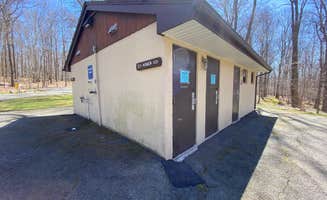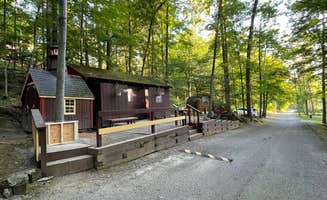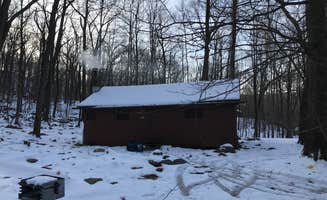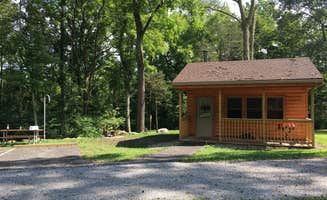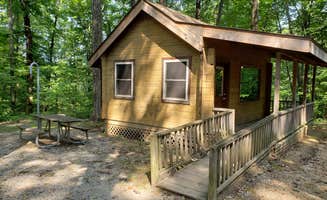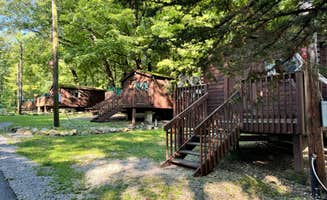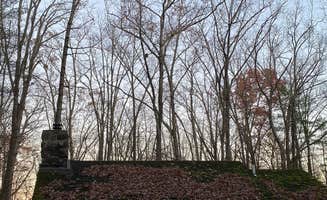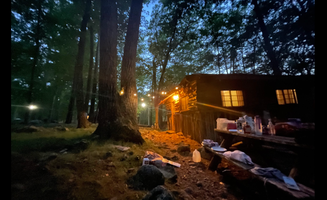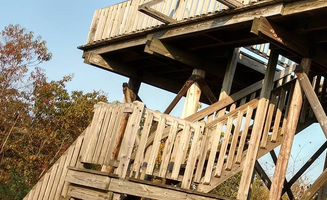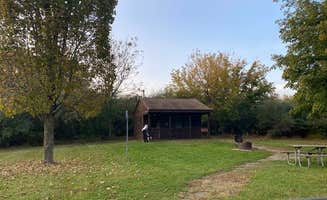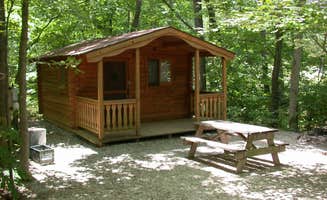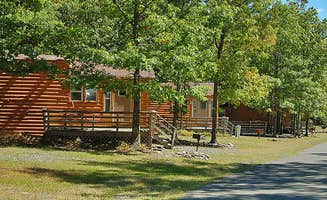New Jersey's northwestern region near Middletown offers camping opportunities amid the Skylands region, with elevations reaching over 1,800 feet at High Point. The area features deciduous forests with hiking trails connecting to the Appalachian Trail system. Winter temperatures can drop below freezing, making seasonal considerations important for cabin rentals throughout the year.
What to do
Wolf watching tours: At Camp Taylor Campground, visitors can take guided tours of the Lakota Wolf Preserve. "You can hear them howl in the distance. It's one of our favorite places to camp," notes one reviewer. The preserve offers discounted tours for campers with educational programs about wolf conservation.
Astronomical viewing: Several camping areas provide dark sky conditions away from urban light pollution. At Camp Glen Gray, visitors can enjoy stargazing from clearings surrounded by forest. "Cabins are always clean and stocked with firewood. Lots of hiking trails," reports one camper, making it an ideal base for night sky activities.
Water activities: Boating and fishing options exist at multiple park lakes across the region. "The lake and pool were a big plus, especially for hot days. While I did not take advantage, you are allowed to rent boats and take them out on the lake," explains a camper from Panther Lake. Many parks rent kayaks, canoes, and paddleboats for hourly or daily use.
What campers like
Private wooded sites: Many campers appreciate natural screening between campsites. At Great Divide Campground, "Sites had room to move and it was quiet and peaceful. Kids had lots of fun on the free kayaks and pool." Wooded areas create separation between camping areas while still allowing for community facilities.
Wildlife encounters: The region offers frequent opportunities to observe native animals. "We got to see their dogs, so that was a bonus for us!" reports a visitor to Jenny Jump State Forest. Another camper mentioned, "We saw wild turkeys and deer in the morning," showcasing the regular wildlife sightings possible throughout the area.
Varied accommodation options: Beyond standard tent sites, diverse shelters accommodate different comfort levels. "The 'shelter' is what we would describe as a 'cabin'; four walls, a roof, locking door, locking windows, large picture frame front window, four beds (two bunks), a wood burning stove, and a porch," describes a Jenny Jump visitor, noting these structures provide more comfort than traditional tent camping.
What you should know
Bear safety protocols: Bear activity requires specific food storage and waste management practices. At Stokes State Forest, "This is bear country so proper food storage is a must. Bear lockers are not provided. The area also has ticks and rattlesnakes." Campers should bring bear-resistant containers or secure food in vehicles overnight.
Bathroom facility limitations: Availability and quality of restrooms vary significantly between parks. "Bathrooms were absolutely disgusting. I thought with COVID they were cleaning them more, but for the entire weekend, someone's #2 remained all over the toilet, floor, and corner wall," reports a visitor to Spruce Run Recreation Area. Other sites like Great Divide receive praise for clean facilities.
Road noise impact: Highway proximity affects some campgrounds more than others. "My only complaint is that the noise from the highway was quite loud at night," notes a Jenny Jump visitor. Sites farther from major roads generally provide a more natural sound experience with less traffic noise interference.
Tips for camping with families
Group site selection: Identify camping areas specifically designed for multiple families. "We have a beautiful site along the creek, perfect white noise to get a great night sleep," reports a camper from Camp Taylor about their creek-side group area. Some sites allow combining adjacent spots for larger gatherings.
Activity scheduling: Plan around scheduled programs for children at busier campgrounds. "Lots of weekend activities. Will be back in the future," notes a visitor to Mahlon Dickerson Reservation, referencing the organized recreation opportunities. Many parks offer weekend programs during summer months, typically running from Memorial Day through Labor Day.
Weather preparation: Temperature variations require flexible gear planning. "We went in November when there was a light rain that turned into a thunderstorm with hail and sleet! It was certainly an adventure," recalls a Stokes Forest visitor, highlighting the need for rain gear and temperature-appropriate clothing even during seemingly mild seasons.
Tips from RVers
Site leveling challenges: Research specific site conditions before arrival. "The 'trailer' sites aren't level," notes a High Point State Park visitor. Bringing additional leveling blocks helps manage uneven terrain at many of the region's more rustic campgrounds.
Hookup limitations: Water and electricity availability varies widely between campgrounds and specific sites. "Website lists water hook ups at long distances but they have hose reels to help with that. Our site (15) said 75' however the 50' hose reel made it to our rv connection," explains a camper from Swartswood State Park Campground. Carrying extension cords and extra water hose sections helps maximize hookup options.
Seasonal site preferences: Consider different areas within the same park based on the time of year. "The gravel driveway is on a 30-40 degree incline. The tent was too long for the 12'x10' platform, so we had to set it up on the flattest part and hope not to roll down the hill in the night," warns a visitor about specific sites at High Point State Park, illustrating why advance research matters for comfortable setup.


